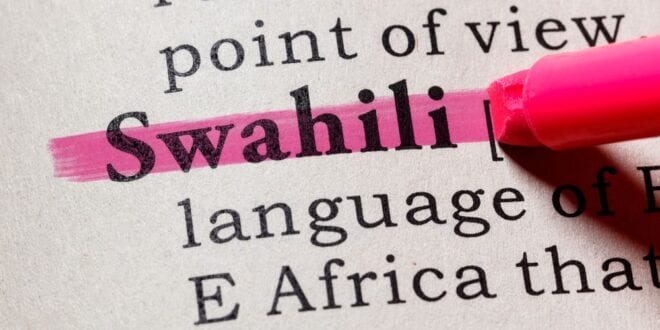Hakuna Matata. When this sentence is translated from Swahili, it means the same as our common saying: No problem! Mom is said the same way – and the sister is ‘dada’. Unlike our language, Swahili has no grammatical cases, and its alphabet is Latin. It is the only official language of the African Union. And what is its impact on other spheres of life, including the economy – read in the text before you.
Swahili: A Language That Unites People
Kiswahili or more precisely Kiswahili belongs to the Bantu language group – a large language group present in the area of sub-Saharan, East Africa. This language is official in four countries – Tanzania, Kenya, Uganda, and Congo. However, it is spoken by tens of millions of people in Burundi, Somalia, Mozambique, South Africa … The number has been growing in recent decades and we can say that today – it has gained the status of the ‘lingua franca’ – a language widely used outside the home country. Today, Swahili is being taught more and more. Knowledge of Swahili helps a lot because almost none of the locals speak English or any other known language. There are lovers of African culture, but also those who lived on the Black Continent – so through the learning of this language, they evoke memories. There are more and more young music listeners who need Swahili knowledge to master the lyrics.
The Language As An Identity Sign Of People And Nations
Languages, without any question, are always and inevitably in contact with other spheres in life – whether they are on a geographical-spatial basis, or it is a matter of cultural-business exchange. At the same time, their mutual borders have never been sharply defined. In such natural conditions – the identity of the language is what ensures its survival in a great family of world languages. The lexicon of one language, as a means of expression – certainly represents a part of the identity of a language, but also the identity of the people. Swahili is one of the most used and widely spread languages in East Africa. The number of speakers arrives at over 100 million people. The huge talking zone, which incorporates a few East African nations, says a lot about the effect of this language in Africa. But what precisely is its effect on the East African economy? We can say momentous.
Business, Travel, And Curiosity – Main Reasons For Learning Swahili
In recent years, more and more people around the world are choosing to study Swahili. Throughout Europe and other countries of the world, you will find workshops for learning foreign languages – in which the Swahili classes are almost filled to the last place. According to KL Translations, the motives for studying are different. Philologists are professionally interested and polyglots want to master another language. Numerous travelers have been or are just planning to set out to explore Africa. Business is also one of the key reasons – because more and more interested investors are coming to East African countries. Knowledge of Swahili helps a lot because almost none of the locals speak English or any other known language.
The Influence Of Swahili On Economic Development In East Africa
The battle for positioning in the worldwide market is expanding and progressing step by step. In this battle for position, East Africa is additionally attempting to discover its place and become more competitive. Today, Swahili is spoken more in Africa than at any time in recent history.
Since this language is acknowledged and perceived by the African Union – today is regularly used for financial and political purposes. The East African Community (EAC) was made exclusively to reinforce the part nations’ economies. Yet, this is going to take an exceptionally extensive period – if the legislatures don’t attempt to consolidate the local communities where genuine economic ability lies. Language is the most significant device when it comes to existence – and empowering the utilization of Swahili language isn’t only extraordinary for the identity of people, but also financial flourishing.

Africa, The Driver Of The World Economy?
Soon, the main players in the world economy could become the countries of sub-Saharan Africa – rich in raw materials, with a young population and a growing middle class. In the last decade, the economic growth of sub-Saharan Africa has been higher than the growth of India. It is predicted that the economy worth a thousand billion dollars – will threaten Brazil in the next ten years. Experts in the field of economics claim that capital is coming to Africa along with new technologies. Such progress has led to a significant jump in productivity and some very interesting solutions. For example, in countries where there are not many banks, mobile banking has enabled the growth of market transactions.
Economic Reforms As Inevitability
African countries are changing and implementing reforms that affect economic growth. That is why, for example, Nigeria’s credit rating has been raised – despite a wave of religious violence and other instability factors. That most populous country in Africa and a large oil producer is in the group of 11 countries that Goldman Sachs claims have the potential to become the largest economies in the 21st century. However, experts also warn of the risks. Among other things, a large part of African exports goes to crisis European countries. In South Africa, they point out that African economies must become more diverse. When the prices of raw materials and products in the world fall, it is necessary to have other economic activities that these countries can rely on. Also, according to economic experts, African countries should trade more with each other.

Africa Smells Like Change
The question is whether African economic growth is sustainable. According to experts – it will largely depend on the development of the situation in African countries, primarily political. The question is whether the established democracies in those countries will stabilize, and it is especially important to what extent and at what pace it will progress, analysts, explain. Africa is still the poorest continent. One-third of the population lives below the poverty line but is full of energy to move forward, looking for their solutions. That’s why Africa, they say, smells of change.
 Imagup General Magazine 2024
Imagup General Magazine 2024



